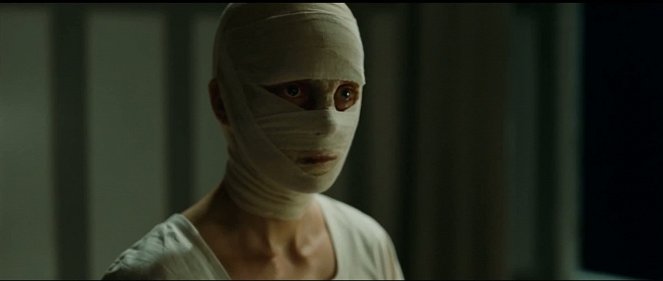Regie:
Christian PetzoldKamera:
Hans FrommMusik:
Stefan WillBesetzung:
Nina Hoss, Ronald Zehrfeld, Nina Kunzendorf, Imogen Kogge, Kirsten Block, Eva Bay, Valerie Koch, Uwe Preuss, Max Hopp, Claudia Geisler-Bading (mehr)Inhalte(1)
Juni 1945. Schwer verletzt, mit zerstörtem Gesicht wird die Auschwitz-Überlebende Nelly von Lene, Mitarbeiterin der Jewish Agency und Freundin aus Vorkriegstagen, in die alte Heimat Berlin gebracht. Kaum genesen von der Gesichtsoperation, macht sich Nelly, den Warnungen Lenes zum Trotz, auf die Suche nach Johnny, ihrer großen Liebe – ihrem Mann, der sie durch sein Festhalten an ihrer Ehe so lange vor der Verfolgung schützen konnte. Doch Johnny ist fest davon überzeugt, dass seine Frau tot ist. Als Nelly ihn endlich aufspürt, erkennt er nicht mehr als eine beunruhigende Ähnlichkeit. Johnny schlägt ihr vor, in die Rolle seiner totgeglaubten Frau zu schlüpfen, um sich das Erbe der im Holocaust ermordeten Familie Nellys zu sichern. Nelly lässt sich darauf ein. Sie wird ihre eigene Doppelgängerin. Sie möchte wissen, ob Johnny sie geliebt hat. Ob er sie verraten hat. Nelly will ihr Leben zurück. (Piffl-Medien)
(mehr)Kritiken (6)
Phoenix, the sixth collaboration of Christian Petzold and Nina Hoss, revives the legacy of so-called “ruin films” (Trümmmerfilmen) such as Murderers Among Us and Germany, Year Zero while also enriching it with elements of Hitchcockian thrillers. In an attempt to overcome the horrors of war without erasing six years of history, Petzold decided to present the story of the Jewish singer Nelly. The first transformation that awaits her following her return has only an aesthetic nature. Though she was able to get her original face back thanks to plastic surgery, her husband does not recognise her. For reasons that will be made clear to us later through the inventive doling out of information, she refuses to admit that she was able to survive. Just like Scottie in Hitchcock’s Vertigo, the film’s main male protagonist begins to “create” his fated wife. He is not aware that he has had her right in front of him the whole time. Nelly obediently fulfils her husband’s wishes, she learns to be herself again and hopes that in the end, with the right dress, hairstyle and walk, she will be accepted in the role that belongs to her. ___ The film’s plot has a slight whiff of trash. However, Petzold resists the temptations of the genre and, through the gradual development of a complex portrait of the central heroine, lays the groundwork for the emotionally devastating climax. He is not interested in shocking plot twists and, with his strictly linear narrative, he does not want to keep us waiting for Johnny to finally recognise his wife. The tension in the film is more subtle in nature and is derived from issues pertaining to shared responsibility for the history of the nation. ___ Viewers who are familiar with German cinema will be pleased by the fact that Petzold intersperses his multi-layered study of the human (in)ability to accept the past with references to Weimar culture, while the stylisation of the mise-en-scène is reminiscent of the style found in film noir. Alongside the identity of one woman and one nation, a film style created by post-war traumas arises us before us like a phoenix from the ashes. ___ Petzold’s outwardly calm and inconspicuous film is a masterfully structured drama that balances a thematically rich web of metaphors with a gripping narrative without the aid of formal or content-related clichés. 85%
()
When it comes to the premise, Phoenix was an incredibly interesting movie. But the disaster was that the two main characters acted like they escaped a madhouse. Nelly is being a poor little thing for the entire hour and a half, her husband is dumb as a doornail and they make up for a good drama together. I was waiting to see which way the director takes the ending and I must say I was disappointed. It started out really well, but then the movie didn’t open up to the viewer at all. I had to draw the conclusions on my own.The Boy in the Striped Pajamas is a similar movie, but I’m certain that it will stay with me forever thanks to its final scene. Unfortunately, Phoenix lacked such a scene.
()
So wie Andrey Zvyagintsevs Leviathan wirkt auch Petzolds Phoenix in Anbetracht der Literarität sowie dem romanähnlich durchdachten Drehbuch als leicht anachronistischer Film. Dieser Anachronismus ist hier jedoch keineswegs schädlich. Der deutsche Regisseur bekennt sich zu einer intellektuellen Tradition, die vielleicht bereits etwas unmodisch ist, macht dies jedoch auf eine äußerst beeindruckende und raffinierte Art und Weise. Dieses Kammerdrama, welches auf drei Charakteren sowie einer konsequenten Betonung von Kleinigkeiten, Hinweisen sowie elliptischen Erzählelementen beruht, ist im traditionellsten Sinne des Wortes beeindruckend - eine intellektuelle Akzentuierung des vielschichtigen Bildes des "Antlitzes der deutschen Nachkriegsgesellschaft", der Schuld, der Identität und selbstverständlich der Liebe. Phoenix ist mit Sicherheit eine Art jüdischer Schwindel, jedoch dort, wo der distanzierte Analytiker Hitch demonstrativ mit psychoanalytischen Konzepten laboriert, widmet Petzold der inneren Welt der Hauptfigur größtmögliche Sorgfalt. Die Art und Weise, wie hier der zerstörte Raum vor der Kamera modelliert wird und Nelly von "akustischen Scherben" umrungen wird, unterstreicht auf einzigartige Weise ihre fragile Hingabe sowie die Unsicherheit hinsichtlich ihrer eigenen Identität. Den Rest erledigt die vollends exakte Nina Hoss. Obwohl die Geschichte an gleich etlichen Stellen am Rande einer Konstruiertheit schwankt, scheitert jedoch die Fähigkeit des Drehbuchautors, von meolodramatischen Zügen abzulassen und in literarischen Dialogen (sowie Bildern) das Leben sowie die semantische Dynamik zu erhalten, nicht. Ich halte das Finale für ein hervorragendes Beispiel, wie die traditionelle Katharsis im besten Sinne des Wortes aufgebaut wird, und zwar unter Hervorhebung sämtlicher brillanten psychologischen Nuancen. Einen besseren Beweis für Petzolds Feinfühligkeit oder seine Mäßigung können wir uns da gar nicht ausdenken. Phoenix ist ein kultiviertes Drama, bei dem es keine Schande ist zu weinen. Denn dieser Streifen hat sich jedes Gramm seiner Schwere redlich verdient.
()
They might have directly called it Das Schwindelgefühl sakumprdum because it was inspired but... you know what. And to its detriment, because from the scene "in Johnny's lair for the first time" on, it will have the exact opposite effect instead of having tension between the characters. This is a great example of plot planning so everything leads to the only one possible outcome. And this outcome, unsurprisingly, is slowly achieved about an hour later. So it works mainly thanks to the introductory third and the central duo (in which he is an unacknowledged German-speaking illegitimate child of Russel Crowe. Even so, it is a solid “Hitch movie", which, paradoxically, is better off in the line of "finally a different grasp of the theme of coping with the return from the concentration camp and post-war identity of the German nation", which in all its subtlety, hints and all that unspoken stuff is much more impressive than if it just followed the genre.
()
Reviewing Phoenix is a really tricky issue. Just to be clear, I have no problem whatsoever labeling Phoenix as a truly bad film. A fundamentally bad film, to be exact. On the other hand, Phoenix is bad in such a charmingly twisted way and its craftsmanship undeniably has many strengths. It's a film that literally screams falsehood. It is untrustworthy in its portrayal of human emotions, thought processes, and the actions of its characters. By attempting to be earnestly serious, it teeters on the edge of absurdity, and by desperately striving for catharsis, it goes beyond that threshold. I actually felt sorry for Nina Hoss for what the director put her through. It's not important that Phoenix is a construct. There are plenty of films like that and yet they manage to be fully functional. One such example is Hitchcock's Vertigo, which many people refer to. The problem is that it is a naive and awkward construct. I liked the cinematography, Ronald Zehrfeld portrayed Johny very nicely, and I also liked the atmosphere. However, my overall impression is still only 40%, and Petzold should be glad for even this modest number, considering how he handled a serious topic.
()
Christian Petzold ist ein hervorragender Regisseur, daran besteht kein Zweifel, formal ist Phoenix meisterhaft gelungen, für mich allerdings war der Inhalt absolut nichts. Es ist möglich, dass ich den Film in der falschen Verfassung gesehen habe, denn ein Kammerdrama ist nicht direkt ein Genre, dass ich jederzeit und unter allen Umständen anschauen kann. Ich gehe mit, dass Nina Hoss unter Petzolds Leitung wieder hervorragend spielt, einige Einstellungen sind ausgeschmückt, das Ende ist erstklassig, trotzdem habe ich mich recht lange gelangweilt und die Handlung im Geist vorgespult. Schade, Barbara war mein stärkstes Erlebnis.
()

